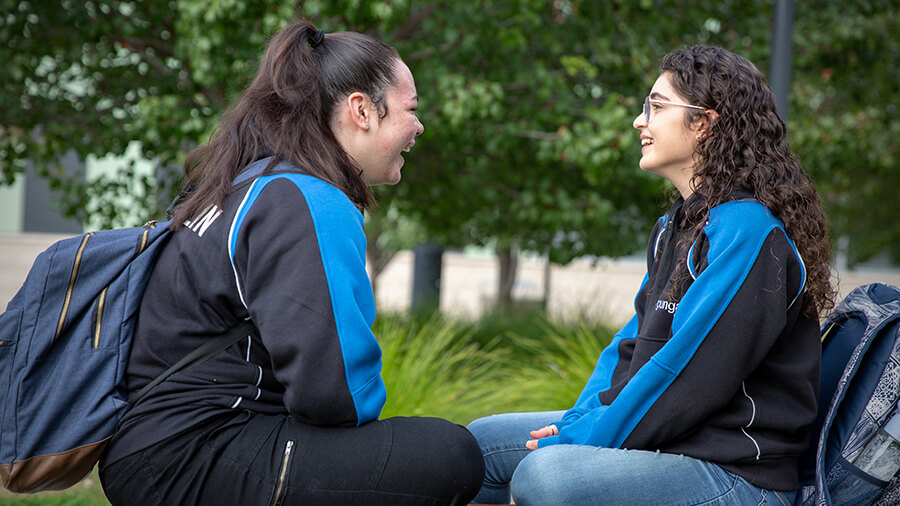
Key Contacts
The Pastoral Care and Wellbeing Directors: Matthew Noonan and Colin Kelley (Acting)
Matthew is responsible for supporting House Coordinators and Student Services on lines 1, 2, 3 and 8
Colin provides support to House Coordinators and Student Services on lines 4, 5, 6 and 7.
The first point of contact for students and families is the House Teams.
| Line: House | |
|---|---|
| Line 4: Hydra | GNGC.Hydra@ed.act.edu.au |
| Line 5: Phoenix | GNGC.Phoenix@ed.act.edu.au |
| Line 7: Scorpius | GNGC.Scorpious@ed.act.edu.au |
| Line 8: Centaurus | GNGC.Centaurus@ed.act.edu.au |
| Line: House | |
|---|---|
| Line 1: Orion | GNGC.Orion@ed.act.edu.au |
| Line 2: Aquila | GNGC.Aquila@ed.act.edu.au |
| Line 3: Tucana | GNGC.Tucana@ed.act.edu.au |
| Line 6: Draco | GNGC.Draco@ed.act.edu.au |
Our model of student welfare is centred around a House model.
Using the house emails provided above, the House Coordinator and Assistants are the first point of call for students and parents when wishing to discuss issues of student welfare and well-being.
Our staff establish strong positive relationships with the students and families that belong to their House.
Houses
Our large student population is divided up into eight houses: Aquila, Centaurus, Draco, Hydra, Orion, Phoenix, Scorpius, and Tucana.
The House team aims to:
- Provide a positive and meaningful teacher/student relationship
- Be a source of advocacy for each student
- Along with the student develop an Individual Pathways Plan
- Track, monitor, report and evaluate students' achievements, standards and progress
The Houses at Gungahlin College, are more than just 'roll call' or weekly notices. It is a sixth class for students and provides them with opportunities to:
- Improve their study and time management skills
- Build resilience
- Contribute to the school and wider community
- Take on leadership roles
- Be explicitly prepared for the transition to a post-school world
- Develop a stronger sense of belonging with their peers, the staff and the school
Each House has a House Coordinator and a House Assistant, overseeing the:
- Student achievement and wellbeing of students in a particular house
- Coordination of College activities that foster 'competitive spirit' between the houses
House activities organised by our House Coordinator team are designed to promote student well-being and a thriving college community. House coordinators and assistants are supported by the Directors of Student Wellbeing, a school psychologist, careers and transition officers, the defence transition mentor and the Student Administration team. Our college executive structure, too, is aligned around student welfare with an Associate Principal of the college, responsible for overseeing student well-being, transitions and cultural competencies.
Please see the Houses page for more details about our pastoral care program.
Positive Behaviour for Learning (PBL)
At Gungahlin College, we have started implementing Positive Behaviour for Learning (PBL). PBL is a whole-school approach to social and academic learning. It supports our college to further enhance our safe and supportive learning environments through strong evidence-based systems and practices. Building on our positive culture across the College provides the best outcomes for everyone: maximising student engagement, wellbeing and academic success; continuing to strengthen student and teacher relationships; and growing student and staff confidence.
As part of our PBL journey we have developed college-wide expectations so all staff and students are working in a positive, predictable and consistent environment.
We now have our STAR expectations.
School Psychologist
If you are finding things difficult in your personal or school life, please do not hesitate to book an appointment to see our school psychologist. Students can book an appointment to meet with him 1 on 1, or with a family member for support.
1. use this link to enter his diary, click on the white block of time available which suits you, enter your details and needs briefly, and click to receive an email confirmation school psychologist
2. his office is located in the Student Services hub, opposite the upstairs Green hub.
Safe and Supportive Schools Contact Officers (SASSCO)
Do you have concerns about or are you experiencing the following from members of our school community?
- bullying
- harassment
- violence
- discrimination
Please contact David Gould or Pam Murray
Both David and Pam are located in the blue staffroom or in Student Services if you would prefer to speak with them in person.
